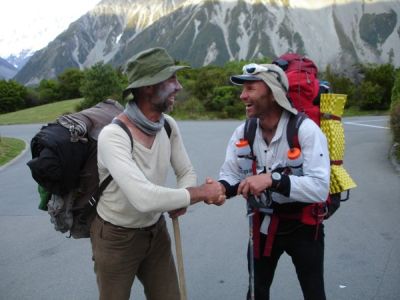Re-enacting an expedition of old, climbers Steve Gurney and Steve Moffatt continue their adventure today as they seek help for Moffatt’s frost-bitten toes after a summit attempt on Aoraki Mount Cook yesterday.
The pair, on a remarkable journey following in the footsteps of 1890 mountaineers Marmaduke Dixon (1862-1918) and George Mannering (1862-1947), faced freezing weather conditions and extreme terrain during Tuesday's push to the summit of Aoraki Mount Cook. They returned to their base camp at the Hermitage Hotel late yesterday with a dramatic tale to tell and an uncertainty about the next stage of the expedition.
While former coast-to-coast champion (Gurney) was kitted out comfortably in the latest 21st century clothing, technology and equipment, Moffatt, a triathlon and endurance athlete, struggled on his ascent, suffering frostbite in his feet, frost nipped fingers, hypothermia* and spells of incoherent speech and dizziness mostly as a result of the old fashioned sporting gear he wore, including leather hob-nail boots as he recreated the conditions his forbears would have faced.
With the experienced help of his climbing partner Gurney, Moffatt was able to make a mountain-side recovery. He then continued to the Summit Rocks – eleven hours into the ascent - the point that the North Canterbury adventure pioneers' Dixon and Mannering reached on their historical, but ultimately unsuccessful mission to summit New Zealand's highest peak. Gurney climbed a further 40-60 minutes to reach the 12, 316ft (3754m) summit.
Speaking from the Hermitage Hotel today after a night's rest and a celebratory meal of locally-caught salmon with fresh vegetables at its Alpine Restaurant (Moffatt ate 1890s-style Crayfish chosen from an unearthed Hermitage menu) Gurney said they were "caught by surprise" by their set-back but was philosophical.
"The direction and outcome from this adventure has always been unknown," he said. "This setback just adds richness to the story. This happened because we had no idea how cold Moffat would get in the gear he was wearing – it was bitter up there, I was shivering but he was freezing.
"I've known Moffatt for 12 years and never seen him in such a bad way. It was certainly drama on the mountain. He was on the verge of unconsciousness and we had to pull on our deepest resources to get off the mountain safely. It puts into perspective just how tough it was for early climbers."
"The extent of frost-bite damage to Moffatt's feet means the completion of our journey by Kayak to Oamaru has a question mark hanging over it. But together we thought, "what would Dixon and Mannering have done?" and I believe they would have sought help and then continued when they could which is exactly what we will do."
The Gurney-Moffatt challenge got underway last Thursday (18 November) shadowing the very route taken by Dixon and Mannering from Christchurch to near the summit of Aoraki Mount Cook then east to Oamaru. Adding a twist to adventure, Gurney uses modern technology and equipment throughout the journey, while Moffatt employs only that which as available in 1890. Gurney began his travels by train while Moffatt set off on horseback.
The aim of the Gurney-Moffatt 2010 expedition is to explore, examine and debate the difference between the adventurers of early New Zealand and today. During the mission the duo's comparison of lifestyles, exercise, nutrition, values, attitudes and society's expectations will be captured on a video-documentary, entitled 'Aoraki Mount Cook to the Sea: The Movie.'
Gurney will accompany Moffatt to visit Timaru doctor, Dick Price, a mountaineer who has climbed Mt Everest and is a specialist in frostbite, for treatment and to determine when the pair will be able to continue their journey.
"An adventure is just that and is never plain-sailing. It's about adjusting as the circumstances change. Things would be bloody boring if everything went to plan."
* The press release said "hyperthermia" but I really don't think that was correct — This email address is being protected from spambots. You need JavaScript enabled to view it.






